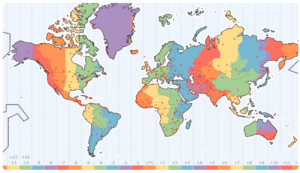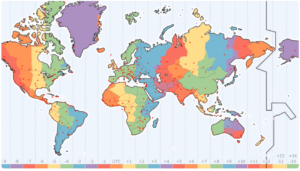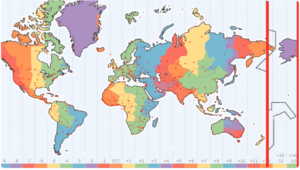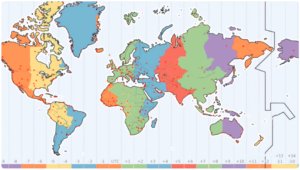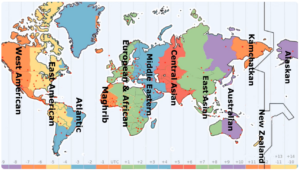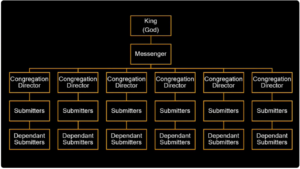Praise be to God! There is no other god except God. In another Friday’s Sermon, you can find the explanation how explicit idol worship is mostly over in this world. However, this does not mean that the majority of people in this world are not idol worshipers. In fact, it’s the opposite. Verse 12:106 says, “the majority of those who believe in GOD do not do so without committing idol worship.” So, how come explicit idol worship is almost over, while the majority of people in the world are still idol worshipers. Well, that’s because of implicit idol worship. So, what is the difference between explicit idol worship and implicit idol worship?
Explicit idol worship is idol worship about which idol worshipers are themselves aware about what they are worshiping. For example, most Hindus are explicit idol worshipers. They agree that they worship another god, which is not the God mentioned in the Bible and the Quran. A large percentage of them also agree and are fully aware that they worship more than one god. So, they know about it, they are aware about it, but they think it’s ok. This is explicit idol worship. Implicit idol worship is the worship of other than God while not being aware about it. For example, no Muslim will ever tell you that they worship Muhammad or Bukhari. No Catholic will tell you that they worship Mary. No Jew will tell you that they worship their own Rabbi or their own nation, but if you analyze carefully, you will see that a majority of them are actually worshiping God and someone else, while it never even crosses their mind that what they are doing is idol worship. So, they don’t explicitly admit it, but from their actions, beliefs, and behaviors, it can be implied – implicit – that they are actually doing implicit idol worship.
So, an easy way to distinguish between explicit and implicit idol worship is to define implicit idol worship as the idol worship which happens among Sunnis, Shias, Christians, and Jews while they are not aware of it. Because, the Jews, Christians, Sunnis, and Shias are explicitly monotheists. That’s what they say they are. What they openly say is the explicit part. But implicitly, most of them are ultimately idol worshipers. On the other hand, explicit idol worship, is basically the worship of gods which are not the God mentioned in the Bible and the Quran – the god of Abraham.
Of course, according to the Quran, both explicit idol worship, and implicit idol worship are evil, but how we react towards people who commit them is slightly different. But, first let me give you some verses which mention examples of both types of idol worship. For example, explicit idol worship is mentioned in verse 28:64. It says, “On the day of Resurrection, it will be said to them, “Call upon your idols (to help you).” They will call upon them (explicitly), but they will not respond.” So, on the day of Resurrection, the Hindus, the explicit idol worshipers, will say, “Shiva, please save us”, “Hanuman, please save us”, “Ganesha, please save us”, “Lakshmi, please save us”, “Krishna, please save us”, “Vishnu, please save us”, but none of these gods will respond, because they don’t exist. So, even on the day of Judgment the idol worshiping Hindus will agree that they were idol worshipers because they will call on their gods. The only Hindus who will be saved on that day will be the non-religious Hindus who suffered in this world, but not the devoted Hindus, but that’s another issue.
On the other hand, any idol worship among the Muslims, Christians, and Jews, is implicit idol worship. They are not aware that most of them are idol worshipers. This is mentioned in Sura 6, from verse 20 until verse 24. These verses tell us, that when the people of the scripture (which includes Christians, Jews, Sunnis, Shias), will be summoned before God, most of them, the idol worshipers among them, will be asked “Where are the idols you set up?” See, the same question is asked to them as to the Hindus, but they will respond differently. What will their response be? They will say, “By God, our Lord, we never were idol worshipers.” See, they did not know that they were idol worshipers. They will be totally surprised that they were idol worshipers. They didn’t think that they were worshiping other than God. They were only implicitly worshiping other gods.
So, the majority of the Christians, or Jews, or Sunnis, or Shias, on the day of judgement will be punished because they were not proper Christians, or proper Muslims, or proper Jews, but most Hindus will be punished exactly because they were proper Hindus. And this is the difference between explicit idol worship and implicit idol worship. For one of them the worshipers are aware of their worship, but for the other, they are not aware of their worship. They are aware about what they are doing, but they are not aware that it counts as idol worship.
So, implicit idol worship sneaks into the lives of the majority of the people while they don’t’ know it, and the Quran gives a few examples of how some things might not seem idol worship, but ultimately, they imply that a certain person is being an idol worshiper.
For example, if you obey an explicit idol worshiper, you also become implicitly an idol worshiper. Because the word “worship” in Arabic also means “serve”. So, if you serve an idol worshiper, you are also serving his idol. So, obeying explicit idol worshipers is implicitly idol worship. Verse 6:121 says, if you obey them, you will be idol worshipers. However, cooperating with implicit idol worshipers is fine, but implicit idol worshipers do not wish to cooperate with us. So, to sum it up for Alban Fejza’s personal case: Most Hindus will go to Hell because Alban Fejza disowns them, but most of the Christians, Jews, Sunnis, and Shias will go to Hell because they disown Alban Fejza.
So, what should be our reaction towards explicit idol worship and implicit idol worship? It’s slightly different. Towards explicit idol worship, we are openly proactively against it. So, we proactively say that we don’t believe in the Hindu gods, even if no one asks us, or even if no one provokes me. But when it comes to implicit idol worship, we only oppose it as a response, depending on our experiences with them, or as a reaction, because you can not be 100% sure that someone is implicitly an idol worshiper, because it’s mostly hidden, so you should not jump into conclusions immediately, unless they force you with their own actions. So, when it comes to Jews, Christians, Sunnis, or Shias, we do not call any individual among them an idol worshiper. The Quran prohibits us to do that in verse 4:94. However, we let the whole world know that the majority of Jews, Christians, Sunnis, or Shias are implicitly idol worshipers, because God says so, but we don’t know for sure which ones exactly. Each of them individually exposes themselves, if when we worship God with our Contact Prayer and Obligatory Charity, they will explicitly disagree to join us. So, if they actively divide themselves from the community of submitters, and this is in Sura 30, verses 31 and 32 which say, “You shall submit to God, reverence Him, observe the Contact Prayers, and – whatever you do – do not ever fall into idol worship, like those who divide their religion into sects; each party rejoicing with what they have.” Because, ultimately, if we are worshiping God alone, why should they not worship with us? There is no reason to divide, just because we might have different opinions. Of course, if we were all equally smart and equal believers, we would also all have the same opinions, but it just happens that we are not equally smart, and therefore we don’t have the same opinions. But different opinions are not a sufficient reason to divide from the community of submitters. So, the half-submitters who are dividing from us, because they are telling us that if we don’t share all the same opinions as theirs we must be in a different group, then they are dividing, and that is idol worship.
Now, if it was an issue of explicit idol worship, we should have divided from them. For example, in Sura 60, verse 4, we see that Abraham and those with him told their people “We disown you and the idols you worship besides GOD” But those people were explicit idol worshipers.
In our case, most Sunnis, Shias, Christians, and Jews are implicit idol worshipers, which means that we don’t separate ourselves from them, because we don’t know individually which one of them is an idol worshiper, until they separate themselves from us, until they divide. They are free to join us in our Contact Prayers and our Zakat, regardless if they have different opinions. We worship God alone, and if they join us in that, they are among us, and if they don’t join, then they are not among us. They are dividers. And don’t worry. They will not stay with us, if they are implicit idol worshipers. Of course, this is true, if we don’t hide our true thoughts. We express the truth about different religious things, and they are free to disagree and stay with us, in which case they are just not being smart, and that’s fine, but if they divide because we expressed our opinions, even though we worship God alone, then they are idol worshipers, according to verse 30:32. Of course, it takes courage to express your opinion, when you know that there is a 90% chance at least that they will divide from you, but that’s why we do the Friday Sermons and the Zakat together, so we can become a strong group of believers first, and as a group it is much easier to express our true opinions in an evil world.
